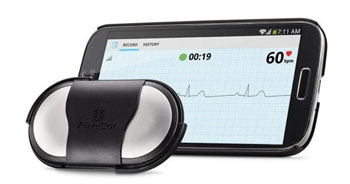Medical-Grade Mobile App Manages Stroke Risk Factors
By Daniel Beris
Posted on 29 Nov 2016
A novel Smartphone app combines electrocardiogram (ECG), body weight, and blood pressure data to improve overall heart health and lower the risk of cardiovascular disease (CVD).Posted on 29 Nov 2016
The result of a collaboration between AliveCor (San Francisco, CA, USA) and the Mayo Clinic (Rochester, MN, USA), the new app, which is available for both Apple iOS and Android platforms, enables users to capture five of the most important factors for evaluating CVD risk: heart rhythm, blood pressure, weight, physical activity, and resting heart rate. Enabling users to view the results provides them with an overall picture of their own health and helps them share readings with loved ones.

Image: The AliveCor mobile ECG recorder (Photo courtesy of AliveCor).
The app combines AliveCor's Kardia app measurements with manually entered weight, together with other data collected by various activity apps. In the case of IOS, users can access Apple Health or Google Fit; Android users can manually enter their blood pressure results and access their readings from Google Fit. In both cases, the indicators have the potential to not only improve heart health but also overall health care for a variety of conditions.
“Mayo Clinic has pioneered new approaches that may uncover significant measures of physiology that have been hidden in individuals' ECGs,” said Vic Gundotra, CEO of AliveCor. “With these new integrations, AliveCor is expanding beyond just atrial fibrillation detection and giving patients more control over their own care. This combination of vital stats gives patients an unprecedented view of their heart disease risk factors, making them more engaged in their heart health care.”
By using AliveCor's deep machine learning capabilities, as applied to over 10 million user ECG recordings of patients at the Mayo Clinic, the two companies will work together to uncover hidden physiological signals to improve heart and overall human health. For example, the health indicators that are uncovered may have implications for patients who are at risk from marked changes in blood potassium levels, such as those with kidney failure.
“Dangerously abnormal potassium levels can impact the morphology of an ECG. The ECG can be used to quantify serum potassium as a significant enhancement to traditional morphology analysis,” said Paul Friedman, MD, a Mayo clinic cardiologist who helped develop the intellectual property that went into the technology. “It is exciting to see the application of machine learning algorithms in ECG and its potential to quickly detect rhythm abnormalities in patients.”
Related Links:
AliveCor
Mayo Clinic














